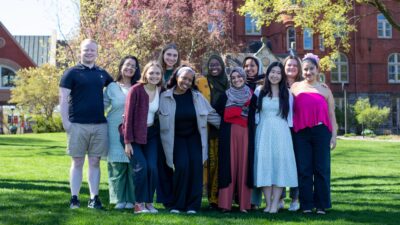
Seniors Hufsa Ahmed (St. Paul), Uditi Chandrashekhar (India and Kashmir), and Anika Brennan (Chicago) are the recipients of the 2024 Global Citizenship Student Awards. The Kofi Annan Institute for Global Citizenship presents the annual award to graduating seniors who demonstrate a commitment to the ideals and practice of high academic performance, internationalism, multiculturalism, and civic engagement. The winners shared some of the steps in their global citizenship journeys.
Hufsa Ahmed
Major: economics and political science
For Hufsa Ahmed, global citizenship starts locally.
“I think it’s easy to get overwhelmed and paralyzed when trying to solve global issues. I’ve always found it helpful to think at a more local level, given that each and every one of us has local connections, we’ve got people we know in our community, and that’s the best place to start,” she says.
This has most shown up in her work with Sunrise Twin Cities, one of the local hubs for the national youth movement pushing for climate action and environmental justice. In her time at Macalester, Hufsa has organized rallies at the state capitol, campaigned for major national legislation, and collaborated with other organizations in the Twin Cities for climate justice.
“I’m most proud of when our local Sunrise hub has united many different people who are able to find their spot in the movement and come together to push for change,” Hufsa says.
In her time at Sunrise, she has been able to capitalize on her St. Paul roots to inform her advocacy and deepen her understanding of her hometown. After Macalester, she is moving to Chicago to become a data analyst for an economic consulting firm. Hufsa sees the framework of global citizenship informing her trajectory post college and looks forward to getting involved in the Chicago organizing scene.
“When we are global citizens, we have a duty to the people we will never meet and making sure that we’re constantly remembering, acknowledging, and serving not just those that we see, but also those we don’t see.”
Uditi Chandrashekhar
Majors: physics and psychology, minor in educational studies
In reflecting on her time at Macalester, Uditi Chandrashekhar highlighted moments of connection and joy. As a leader in MASECA, the South Asian cultural organization on campus, where she worked to organize the group’s first in-person event after Covid-19 restrictions were lifted.
“That first Chai Evening in fall of 2021 was really special. We stepped into it with a very heavy sense of responsibility in talking about what it means to be South Asian and who gets to feel pride in being South Asian,” she says.
Uditi, who is passionate about educational equity and access, was a teaching fellow at Breakthrough Minneapolis for a summer, working with middle school students typically underrepresented on college campuses.
“As an educator, I don’t ever want to find myself caught up in the idea of an average student,” she says.
Uditi is driven to recognize the individual challenges and possibilities of every student, a principle that also extends to her work in International Student Programs where she helps international students navigate the academic, cultural, and legal adjustments that she also experienced coming to Macalester from India and Kashmir.
“At its core, global citizenship is unpacking the power we hold and the responsibility we have to where we are, where we have been and where we are lucky enough to go.”
Anika Brennan
Major: sociology
Anika Brennan has a complicated relationship with citizenship and its modern definitions. She’s seen first hand how it’s been used to “violently order” people through her work at Elimisha Kakuma, an organization that provides higher education opportunities to students living in Kakuma Refugee Camp in Kenya. However, she sees the promise of belonging in global citizenship and its expansive definition beyond citizenship in a nation state.
Anika first began working with students over Zoom at Kakuma as an English tutor during the summer after her freshman year. Since then, she began teaching her own classes and became the assistant director of academics, designing curriculum for high school graduates that want to pursue higher education.
“Education is deeply healing,” she says.
Kakuma is home to 170,000 refugees, only a fraction of which graduate high school and go to college. Through her work at Elimisha Kakuma, Anika teaches college preparatory classes and advises students in the college application process. The throughline of her academic and professional journey has been the experience and systems of migration and refugee resettlement. After graduating from Macalester, she is moving to Kenya and working full time with students at Kakuma.
“I feel an out-of-body gratitude towards my colleagues, students, and their families.”
April 17 2024
Back to top




